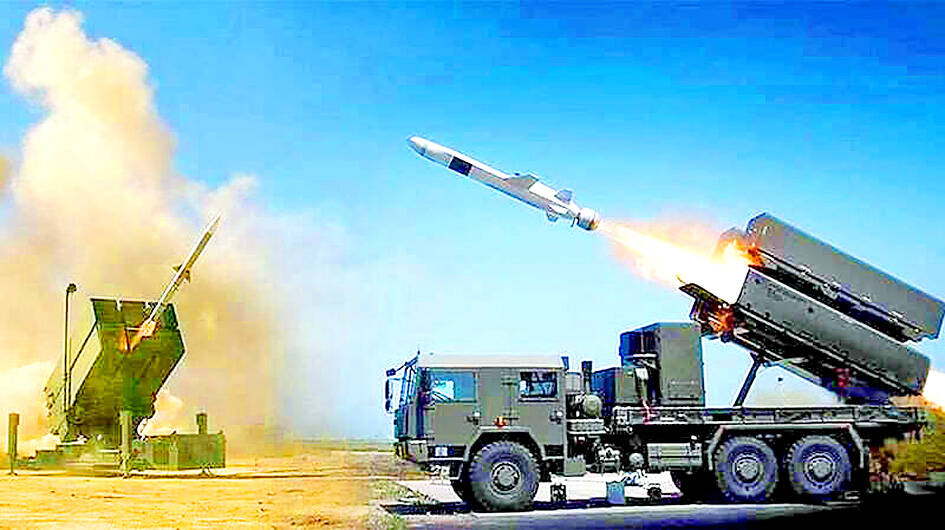Taiwan has signed a NT$24.99 billion (US$761 million) procurement contract with the US for three Norwegian Advanced Surface-to-Air Missile Systems (NASAMS) to aid air defense capabilities in northern Taiwan, the Ministry of National Defense said yesterday.
The contract was signed by the Defense Mission to the US and the American Institute in Taiwan, amounting to nearly NT$24.99 billion with a six-year time limit for contract performance that runs from Jan. 14 through Dec. 31, 2030, the ministry said in a statement published on the Government e-Procurement System yesterday.
The NASAMS would be delivered to Taipei’s Songshan District (松山) and New Taipei City’s Tamsui District (淡水), where they are expected to be deployed, it said.

Photo: screen grab from the Kongsberg Defence and Aerospace Web site
A source, who wished to remain anonymous, said that there is a chance of the first NASAMS being delivered by the end of this year.
The US Defense Security Cooperation Agency (DSCA) on Oct. 25 last year said that the US Department of State had approved three arms sales to Taiwan, including the NASAMS, an L-band AN/TPS-77 long-range radar system and an S-band AN/TPS-78 long-range radar system, which were initially projected to cost about NT$65.2 billion.
The ministry last month said that contracts for the three arms procurements would be signed and delivered by 2034.
The ministry signed four procurement contracts for NASAMS with the US which cost NT$49.3 billion, much less than the NT$65.2 billion estimated and announced by the US government, the source said.
The actual expenditure could be lower because it depends on raw material prices, production costs, order quantities and competing buyers, the source said.
As the ministry’s budget for NASAMS procurement remains classified for this fiscal year, the actual amount of the procurement would not be unveiled until the classified budget is disclosed next year, they said.
According to the DSCA, the new procurement of three NASAMS also included 123 AIM-120 advanced medium-range air-to-air missiles, which have a range of up to 50km.
The missiles would be deployed in Taipei and New Taipei City to complete the air defense capabilities in that area in addition to the Patriot Advanced Capability-3, Tien Kung (Sky Bow), Lu Chien II (Land Sword II) and AN/TWQ-1 Avenger missile systems.
The use of NASAMS would boost operational flexibility, as they are compatible with the ammunition employed by F-16 aircraft, including AIM-120 missiles and AIM-9X Block II Sidewinder missiles.

INVESTIGATION: The case is the latest instance of a DPP figure being implicated in an espionage network accused of allegedly leaking information to Chinese intelligence Democratic Progressive Party (DPP) member Ho Jen-chieh (何仁傑) was detained and held incommunicado yesterday on suspicion of spying for China during his tenure as assistant to then-minister of foreign affairs Joseph Wu (吳釗燮). The Taipei District Prosecutors’ Office said Ho was implicated during its investigation into alleged spying activities by former Presidential Office consultant Wu Shang-yu (吳尚雨). Prosecutors said there is reason to believe Ho breached the National Security Act (國家安全法) by leaking classified Ministry of Foreign Affairs information to Chinese intelligence. Following interrogation, prosecutors petitioned the Taipei District Court to detain Ho, citing concerns over potential collusion or tampering of evidence. The

‘FORM OF PROTEST’: The German Institute Taipei said it was ‘shocked’ to see Nazi symbolism used in connection with political aims as it condemned the incident Sung Chien-liang (宋建樑), who led efforts to recall Democratic Progressive Party (DPP) Legislator Lee Kun-cheng (李坤城), was released on bail of NT$80,000 yesterday amid an outcry over a Nazi armband he wore to questioning the night before. Sung arrived at the New Taipei City District Prosecutors’ Office for questioning in a recall petition forgery case on Tuesday night wearing a red armband bearing a swastika, carrying a copy of Adolf Hitler’s Mein Kampf and giving a Nazi salute. Sung left the building at 1:15am without the armband and apparently covering the book with a coat. This is a serious international scandal and Chinese

Seventy percent of middle and elementary schools now conduct English classes entirely in English, the Ministry of Education said, as it encourages schools nationwide to adopt this practice Minister of Education (MOE) Cheng Ying-yao (鄭英耀) is scheduled to present a report on the government’s bilingual education policy to the Legislative Yuan’s Education and Culture Committee today. The report would outline strategies aimed at expanding access to education, reducing regional disparities and improving talent cultivation. Implementation of bilingual education policies has varied across local governments, occasionally drawing public criticism. For example, some schools have required teachers of non-English subjects to pass English proficiency

TRADE: The premier pledged safeguards on ‘Made in Taiwan’ labeling, anti-dumping measures and stricter export controls to strengthen its position in trade talks Products labeled “made in Taiwan” must be genuinely made in Taiwan, Premier Cho Jung-tai (卓榮泰) said yesterday, vowing to enforce strict safeguards against “origin laundering” and initiate anti-dumping investigations to prevent China dumping its products in Taiwan. Cho made the remarks in a discussion session with representatives from industries in Kaohsiung. In response to the US government’s recent announcement of “reciprocal” tariffs on its trading partners, President William Lai (賴清德) and Cho last week began a series of consultations with industry leaders nationwide to gather feedback and address concerns. Taiwanese and US officials held a videoconference on Friday evening to discuss the